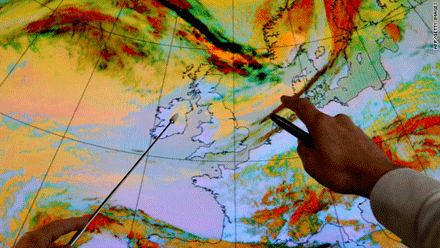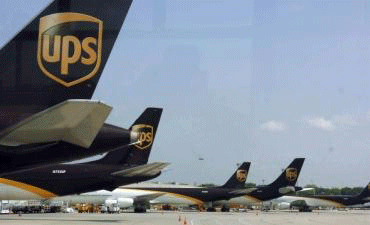Volcano Grounds Air Cargo

Backpackers in Bristol take delay in stride spending
a Spring 2010 weekend al-fresco awaiting reopening of London airports.
|
Virgin Atlantic Cargo in
an email to its customers Saturday April 17 speaks volumes for an industry
thrown into unexpected chaos as that Iceland volcano continues to change
everything for the airline business.
“We have cancelled all flights in
and out of the UK and are no longer able to accept cargo at any of our
facilities throughout the United States,” advises VS Cargo.
But Panalpina, a leading air freight forwarder
raised its air cargo rates noting on its website:
“All flights to and from Europe
are affected on all routes and many are already cancelled.
“Specifically on the trade Far East
Westbound, the volcanic shutdown further deteriorates the current tight
capacity and leads to additional bottlenecks.
“For example, some carriers in China
have already stopped accepting cargo due to unavailable warehouse space
at the airports, and grounded most flights.
 “As an unfortunate consequence,
backlog continues to build up at many origins.
“As an unfortunate consequence,
backlog continues to build up at many origins.
“As soon as flight operations are
back to normal, additional capacity at higher cost will be required
to clear backlog. “Consequently
airlines are implementing a rate increase with immediate effect and
until further notice.
“Although Panalpina is working on
optimizing procurement in the customers' interest, the present situation
leaves no alternative but to pass on this rate increase as of today.”
Once upon a time a city dweller said:
“I don’t trust air I cannot
see.”
Down on the ground this may be remembered
as the weekend that we learned just how much Mother Nature still calls
the shots, and also of “The Volcanic Ash Advisory Center (VAAC)
in London” as one of nine go-to offices at various locations around
the globe charged with informing the world which volcano poses a threat
to the air every airplane engine must breathe.
But to look at the VAAC site online and
attempt to read the updates probably requires a meteorological degree
(http://www.metoffice.gov.uk/aviation/vaac/vaacuk.html).
In any case as this is written midday
Saturday in New York City, the latest bulletin from Volcano Ash London
declares:
“The high atmospheric pressure over
the Atlantic is dictating that the wind strengths and the cloud will
stay in northern Europe.
“However, should the pressure change,
the cloud could move more toward the Mediterranean.”
If that sounds a bit like “we are
not sure what is going to happen,” you get no argument from us.
On a typical day U.S. Flags operate almost
three hundred fifty flights to and from Europe.
This weekend that number is about 75 per
day as impact of that Iceland Volcano continues to be felt although
according to latest reports eruptions seem to be waning.
Neel Shah, Cargo chief at Delta takes
that carrier’s position as number one across the Atlantic very
seriously as he looks at flights today and tomorrow.
“The problem is getting more severe
as the cloud impacts more of Europe. “Currently we have 95 cancels
for today and 86 for tomorrow,” Mr. Shah tells Air Cargo News
FlyingTypers on Saturday.
Likewise the air above Europe is still
an uncertainty for market leader Lufthansa Cargo in Germany.
Reached in Cologne spokesman Nils Haupt
reported “no change” in earlier reports that the ash cloud
continues to blanket Northern Europe.
“Our next crises meeting is tomorrow
(Sunday) morning, meantime we are still grounded.
“Our overriding mission is to keep
our service and business partners in the loop with information updates
as soon as we have them at www.lufthansa-cargo.com.”
Meantime as indication of the worldwide
impact of the Iceland volcano, Forbes Business reports thousands of
air passengers were stranded in Asia for a second day Saturday as flights
were grounded including at least 45 flights between Europe and Asia
were cancelled Saturday.
David Epstein, corporate affairs manager
for Qantas told reporters that the carrier thinks it will take a week
to sort things out.
Qantas also said its five daily flights
Australia to Europe via Asian cities took off, then stopped at the intermediate
Asian destinations.
“Safety before schedule,”
Epstein told reporters in Melbourne.
U.S. airlines said most flights to or
from Europe were canceled on Saturday.
American Airlines canceled 56 flights the same as Friday although AA
did serve Spain and Italy on Saturday.
In terms of financial impact on airlines,
IATA says carriers are losing about $200 million a day.
Reuters reported that shares in “Lufthansa,
British Airways, Air Berlin, Air France-KLM, Iberia, Ryanair and SAS
fell between 2 and 4 percent Friday.
“Fraport AG, says its initial estimate
for the cost of the closure to be between 2.5 million and 3 million
Euros per day,” Reuters said.
 As for air cargo, impacted first are flights
of perishables including fruits and vegetables, flowers and mail although
most experts say near term at least there should be no significant shortages.
As for air cargo, impacted first are flights
of perishables including fruits and vegetables, flowers and mail although
most experts say near term at least there should be no significant shortages.
Meantime UPS closed its Euro hub in Cologne
on Friday limiting its ability to move cargo between the United States
and Europe and between Europe and Asia saying it would reopen but leaving
exactly when— up in the air.
Jackie Blair a UPS communications manager
said:
“UPS will continue to pick up and
deliver packages within Europe while moving some of its cargo within
Europe by ground, Blair said.
“Customers are being advised to
track their packages at www.ups.com to determine the length of delays.”
Geoffrey
|

